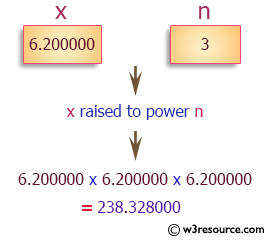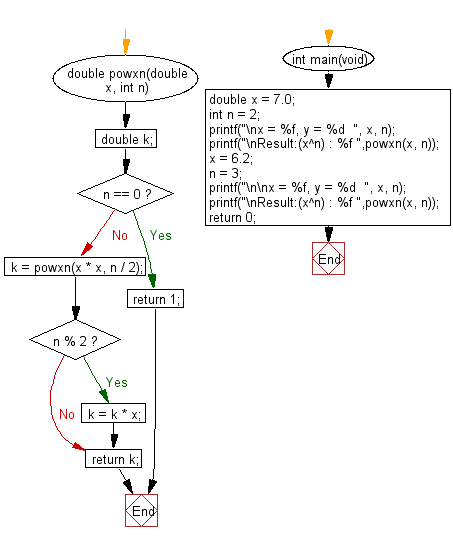C Exercises: Calculate x raised to the power n
C Programming Mathematics: Exercise-4 with Solution
Write a C program to calculate x raised to the power n (xn).
Example:
Input:
x = 7.0
n = 2
x = 6.2
n = 3
Output:
Result:(x^n) : 49.000000
Result:(x^n) : 238.328000
Pictorial Presentation:

Sample Solution:
C Code:
#include <stdio.h>
#include <limits.h>
double powxn(double x, int n) {
double k;
if (n == 0) return 1;
k = powxn(x * x, n / 2);
if (n % 2) k = k * x;
return k;
}
int main(void)
{
double x = 7.0;
int n = 2;
printf("\nx = %f, y = %d ", x, n);
printf("\nResult:(x^n) : %f ",powxn(x, n));
x = 6.2;
n = 3;
printf("\n\nx = %f, y = %d ", x, n);
printf("\nResult:(x^n) : %f ",powxn(x, n));
return 0;
}
Sample Output:
x = 7.000000, y = 2 Result:(x^n) : 49.000000 x = 6.200000, y = 3 Result:(x^n) : 238.328000
Flowchart:

C Programming Code Editor:
Improve this sample solution and post your code through Disqus.
Previous: Write a C program to check whether an integer is a palindrome or not.
Next: Write a C program to get the kth permutation sequence from two given integers n and k.
What is the difficulty level of this exercise?
Test your Programming skills with w3resource's quiz.
C Programming: Tips of the Day
Static variable inside of a function in C
The scope of variable is where the variable name can be seen. Here, x is visible only inside function foo().
The lifetime of a variable is the period over which it exists. If x were defined without the keyword static, the lifetime would be from the entry into foo() to the return from foo(); so it would be re-initialized to 5 on every call.
The keyword static acts to extend the lifetime of a variable to the lifetime of the programme; e.g. initialization occurs once and once only and then the variable retains its value - whatever it has come to be - over all future calls to foo().
Ref : https://bit.ly/3fOq7XP
- New Content published on w3resource:
- HTML-CSS Practical: Exercises, Practice, Solution
- Java Regular Expression: Exercises, Practice, Solution
- Scala Programming Exercises, Practice, Solution
- Python Itertools exercises
- Python Numpy exercises
- Python GeoPy Package exercises
- Python Pandas exercises
- Python nltk exercises
- Python BeautifulSoup exercises
- Form Template
- Composer - PHP Package Manager
- PHPUnit - PHP Testing
- Laravel - PHP Framework
- Angular - JavaScript Framework
- Vue - JavaScript Framework
- Jest - JavaScript Testing Framework
